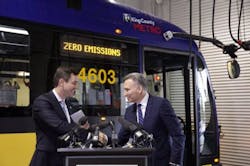Largest Battery-Electric Bus Order in North America: King County Metro Makes History
Over the past two decades, the pace of innovation-driven change seems to be accelerating, with technological breakthroughs massively impacting entire nations, industries, individual companies, and our personal lives. Transportation markets are in the midst of one such change, which Andrew Beebe, Obvious Ventures managing director and Proterra investor, has described as “the coming electrification of everything.” At Proterra, we’re convinced that the bus transit market will be the first transportation sector to fully adopt electrification as the primary source of motive power.
Transformations like this one can seem random and chaotic, but the journey of disruptive change actually follows a well-worn path. One of the best-known descriptions of this process was laid out by Geoffrey Moore in his classic book, “Crossing the Chasm.” In this work, Moore describes the moment when disruptive technologies make the leap from the early adopter customer to the early majority, signaling the maturity of a technology and its acceptance as a mainstream solution.
While it’s difficult to identify a single event as the beginning of a new phase in this process, it is very likely that King County Metro’s recent announcement of a major electric bus order to service the city of Seattle and surrounding communities will be viewed as the moment that battery-electric buses crossed over to mainstream acceptance. As part of a commitment to purchase 120 battery-electric buses by 2020, King County Metro has announced the first group of these buses, with 73 Proterra Catalyst vehicles now on order and initial deliveries coming this year. In the words of King County Executive Dow Constantine, “We are convinced that this technology has crossed the threshold from promising to practical.”
Seattle’s King County Metro is no stranger to the role of validating new technology, with many industry observers pointing to the agency’s purchase of 500 diesel-hybrid buses a generation ago as the trigger that launched the last wave of transit technology into the mainstream. With full battery-electric vehicles now poised to rapidly replace diesel-hybrid buses, King County Metro is once again taking a leadership role in signaling the maturity of a new technology. The recent order comes on the heels of extensive, real-world testing in Seattle’s challenging operating environment. In addition to nearly a year of operation in revenue service, the Proterra Catalyst was also subjected to an intensive 106-day stress test, covering over 32,000 miles in continuous, around-the-clock operations, weighted at more than a full passenger load.
King County Metro and Proterra share a powerful vision for mass transit: leveraging advanced technology to eliminate fossil fuels from our cities, providing cleaner skies and healthier communities. This vision is also in the DNA of Proterra’s list of early battery-electric adopters, including Foothill Transit in Pomona CA, San Joaquin RTD, San Antonio VIA, Worcester Regional Transit Authority, RTC Washoe in Reno, Louisville’s Transit Authority of River City, Nashville MTA, Tallahassee’s StarMetro and CatBus in Seneca SC. Since the deployment in these first cities, 27 more agencies in twenty states across the country have followed their lead in embracing Proterra battery-electric technology. We are grateful for the leadership and innovation demonstrated by these agencies. Together we are building this market and effecting positive change in our vital mass transit industry. We hope that other agencies throughout the country will soon join them.
At Proterra, we look forward to a future day when the last diesel transit bus is retired from service. At that moment, it’s entirely possible that people will look back to this date in history as a major turning point in the journey to our zero-emissions future. We applaud King County Metro for their leadership and look forward to supporting them on the road ahead.
This origionally apeared on Proterra's blog on 1/19/2017. See more at https://www.proterra.com/news-resources/blog/largest-battery-electric-bus-order-king-county-metro-makes-history/
About the Author
Matt Horton
Chief Commercial Officer
Prior to joining Proterra, Matt Horton served as CEO of Propel Fuels, Inc., a leading clean transportation company. Horton led Propel through a period of high growth, earning Propel a spot on the Inc. 500 as one of America’s fastest growing companies. While there, he was responsible for strategy and planning, government relations, operational execution, financial management, investor relations, communications, partnerships and corporate development.
